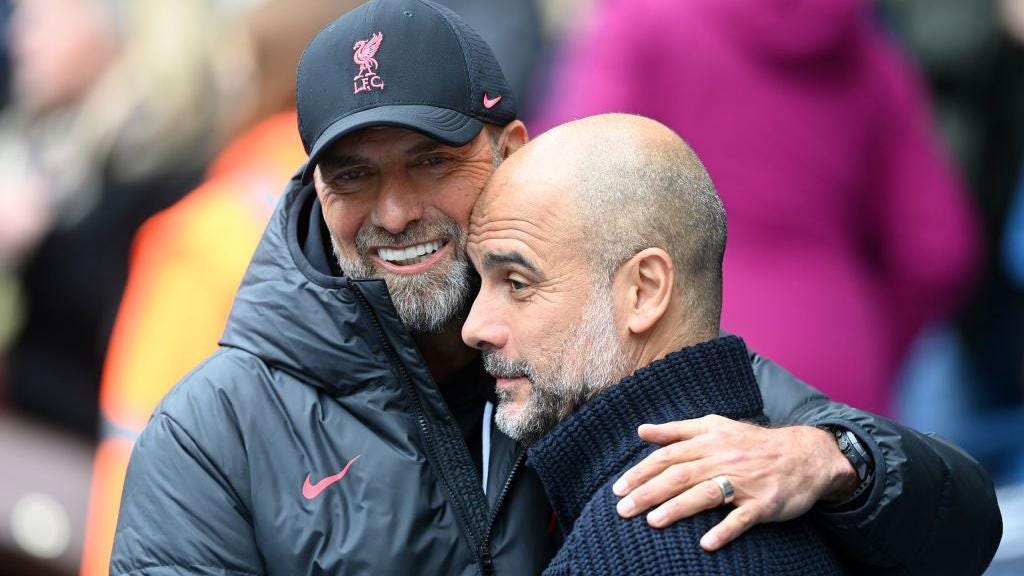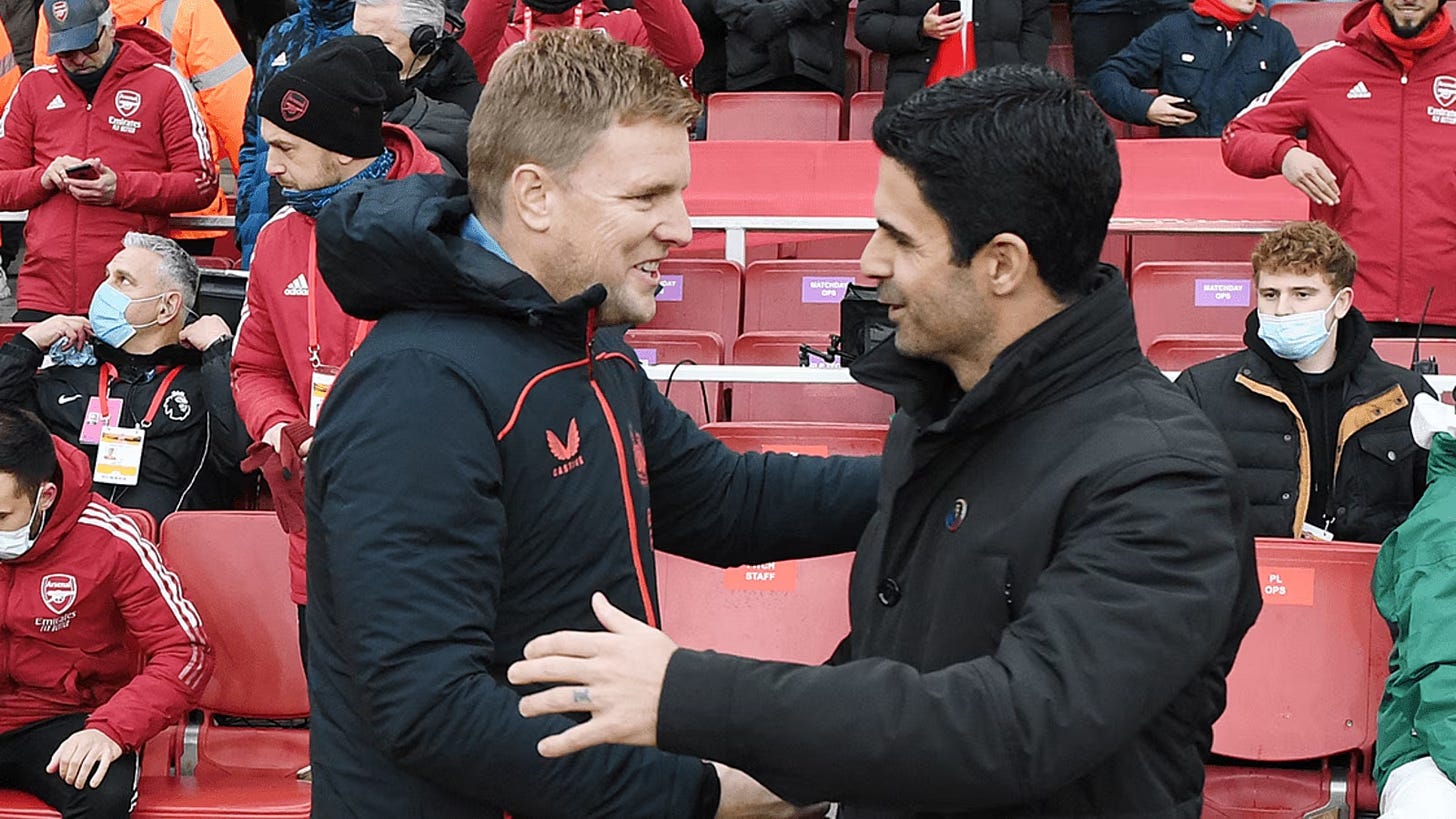The Managers Who Changed Football Forever
A decade after Klopp’s arrival, the Premier League’s biggest lesson is clear...success belongs to those who build, not those who panic.
Ten Years of Change: What the Premier League Has Taught Us About Managers
Ten years ago this week, Jurgen Klopp walked through the doors at Anfield and changed the shape of modern English football. His time at Liverpool came to an end just over a year ago, yet his influence still casts a long shadow across the game. The German’s appointment was not simply about a manager taking charge of a football team. It marked a shift in how clubs think, how they operate, and how success in the Premier League is now defined.
Over the past decade, the league has evolved into a laboratory for managerial philosophies. It has become a proving ground for leadership models, recruitment systems, and boardroom patience. What we have witnessed is a tale of two approaches: the methodical builder and the short-term fixer. One wins titles and leaves legacies. The other tends to leave chaos and excuses.
The Value of Structure and Stability
The common thread running through the last ten years is that structure and stability remain the most valuable currencies in football. Pep Guardiola and Klopp are the clearest examples. They were not instant successes. Both had the space and trust to build, to fail, and to rebuild. Over time they created clubs that reflected their own beliefs, not just in playing style but in culture and behaviour.
At Manchester City, Guardiola was given control over recruitment, academy structure, and performance analysis. The football he has produced has become both art and automation, beautiful yet ruthless. Klopp, meanwhile, built Liverpool around energy and unity. His greatest achievement was not a single trophy but the sense that every fan, player, and staff member believed in the same cause.
Eddie Howe has quietly followed that pattern at Newcastle. His success is grounded in gradual improvement rather than revolution. He has shaped a team that feels cohesive, progressive, and sustainable. The lesson is simple. Managers thrive when their clubs know what they are trying to be.
The Cost of Constant Change
At the other end of the spectrum lie those clubs that treat the manager’s seat like a revolving door. Chelsea, Manchester United, Tottenham, and others have shown how impatience and ego can destroy potential. Each new appointment brings promises of a fresh start, yet most end up repeating the same mistakes.
Clubs that change direction every season rarely create anything lasting. The players grow confused. The recruitment becomes scattergun. The supporters lose faith. The Premier League has never been short of brilliant coaches, but too many have been undone by the chaos around them.
This is what I call the illusion of the quick fix. A struggling club throws money at big names, expects instant miracles, and then presses reset again when it fails. There is no time for foundations, only fire drills and headlines.
Different Managers, Different Missions
When you look back over the decade, clear archetypes emerge. Guardiola and Klopp belong to the rare group of architects who build from the ground up. They are visionary and relentless. Howe and Mikel Arteta fit a similar mould, carefully crafting environments that reflect their ideals.
Then there are the rebuilders, those who arrive to stabilise rather than revolutionise. Managers like Unai Emery and Roberto De Zerbi have shown that progress does not always need a blank canvas. It can be about refining and improving what already exists.
The firefighters are another breed altogether. Sam Allardyce, Sean Dyche, Roy Hodgson. They are summoned to drag teams away from disaster. They rarely get the luxury of time but they understand survival better than anyone.
And finally, the celebrity fixers. These are the managers brought in for their name as much as their methods. They can spark life for a season but are usually gone before their ideas take root. The Premier League is littered with examples of such short-lived marriages of convenience.
Lessons From the Decade
The last ten years have made one truth clear. The best managers are not simply tacticians. They are integrators, capable of uniting every department within a club. They must understand recruitment, psychology, data, youth development, and fan culture. They must become both leaders and diplomats.
Equally, the days when a manager alone could transform a club are gone. Football has become too complex and too interconnected. A great manager without the right structure is like a conductor without an orchestra. The music will falter no matter how passionate the gestures.
The most successful clubs of the decade have invested in their frameworks as much as their front men. Recruitment is data-led. The academy is aligned with the first team. The boardroom understands the football identity. Those that fail to connect these dots drift between styles and philosophies, chasing the success they once had rather than building the success they need.
My View: The Manager Is Still the Heartbeat
For all the analysis, numbers, and structure, football still breathes through its managers. They are the heartbeat. The tone-setters. The ones who carry the hopes of thousands. Yet they must now work within systems that both empower and restrict them.
Klopp showed that authenticity matters. Guardiola showed that detail wins. Howe and Arteta have shown that patience and clarity can still beat money if harnessed properly. The modern Premier League manager is a blend of scientist, psychologist, and storyteller.
I have always believed that a manager should be the face of a club, not its shield. Too often they are sacrificed for deeper failings. Yet when club and coach move in the same rhythm, something special happens. It is visible in the football, in the atmosphere, even in the way players carry themselves on the pitch.
Where the Next Decade Might Lead
Looking ahead, it feels as if the Premier League has entered a new phase. The spending arms race will continue, but so too will the battle for smarter structures. Clubs are beginning to realise that stability brings its own form of power.
We are likely to see fewer old-school managers and more collaborative projects. The directors of football and performance analysts will grow in influence. But the human factor, the charisma of leadership, will remain priceless.
Ten years on from Klopp’s arrival, it is fitting to reflect not only on the trophies but on the transformation of English football itself. Managers are now measured by culture as much as by points. Those who adapt, inspire, and align their clubs from top to bottom will define the next chapter. Those who do not will be remembered as passengers in a league that rewards vision.
Football changes every season, yet its lessons rarely do. The clubs that succeed are those that trust their managers, trust their plan, and stay true to who they are.



